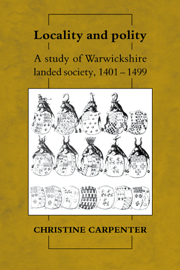Book contents
- Frontmatter
- Contents
- List of figures and tables
- Preface
- List of abbreviations
- Note on text
- 1 Introduction
- PART I STRUCTURAL
- PART II CHRONOLOGICAL
- 9 Social and political networks 1401–50
- 10 Warwickshire under Richard Beauchamp: 1401–39
- 11 The interregnum: 1439–49
- 12 The period of crisis I: Warwickshire under the Kingmaker: 1449–61
- 13 The period of crisis II: Warwickshire under the Kingmaker and the duke of Clarence: 1461–78
- 14 The period of crisis III: Warwickshire under the crown: 1478–85
- 15 The period of crisis IV: Warwickshire under the crown: 1485–99
- 16 Politics and society c. 1449–1500
- 17 Conclusions
- Appendices
- Bibliography
- Index
16 - Politics and society c. 1449–1500
Published online by Cambridge University Press: 27 October 2009
- Frontmatter
- Contents
- List of figures and tables
- Preface
- List of abbreviations
- Note on text
- 1 Introduction
- PART I STRUCTURAL
- PART II CHRONOLOGICAL
- 9 Social and political networks 1401–50
- 10 Warwickshire under Richard Beauchamp: 1401–39
- 11 The interregnum: 1439–49
- 12 The period of crisis I: Warwickshire under the Kingmaker: 1449–61
- 13 The period of crisis II: Warwickshire under the Kingmaker and the duke of Clarence: 1461–78
- 14 The period of crisis III: Warwickshire under the crown: 1478–85
- 15 The period of crisis IV: Warwickshire under the crown: 1485–99
- 16 Politics and society c. 1449–1500
- 17 Conclusions
- Appendices
- Bibliography
- Index
Summary
It is time to draw up a balance sheet, to assess the gains and losses of Warwickshire society in these troubled years and to investigate the long-term effects on local society of living in conditions of political uncertainty for the best part of half a century. The obvious starting-point is the networks that bound landowners together in neighbourhoods within the county; did they survive and were there still forces capable of linking them together across the county? If we replicate more briefly the survey done in chapter 9, we find a situation of greatly increased complexity, in which it has become much harder to find a recognizable pattern. This is due only to a limited extent to diminishing evidence, although the Archer collection becomes noticeably less dense towards the end of the century. The real problem is that the extreme volatility of politics for much of the period forced the major gentry families, who throughout the century provide the bulk of the evidence, into an almost continual process of political readjustment. In a county like Warwickshire, where the nobility had hitherto played such a dominant role, this tended, at least in the first part of the period, to mean moving between groupings associated, however briefly, with a particular magnate. The net result was that few local networks formed by the inter-relationships of the more eminent gentry retained a fixed identity, or even an existence, for long. Since the evidence is inevitably patchy, it is not easy to trace their development or to be very certain about their composition at any one point. Under these circumstances, indications of the survival of localised groupings, however sparse and sporadic, must be taken very seriously.
- Type
- Chapter
- Information
- Locality and PolityA Study of Warwickshire Landed Society, 1401–1499, pp. 597 - 614Publisher: Cambridge University PressPrint publication year: 1992



